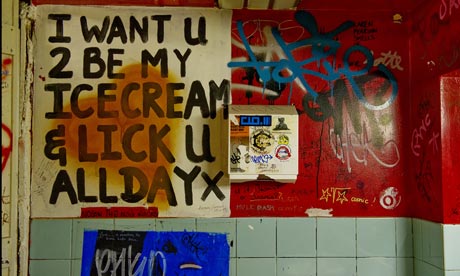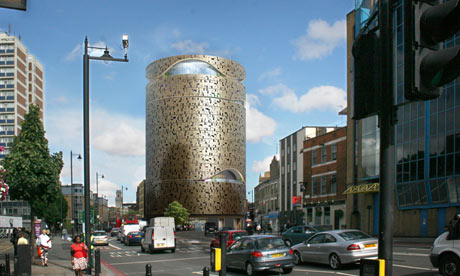Foundry arts space set to make way for 18-storey hotelBeloved centre of London's alternative art scene for a decade is set for demolition, but six-metre Banksy mural to be preserv
The Guardian, Thursday 4 February 2010

The Foundry pub and art venue, run by Tracey and Jonathan Moberly, is to be demolished and replaced with a hotel and shopping complex. Photograph: Sarah Lee
Pete Doherty used to host its poetry nights, the band Hot Chip formed there, and artists from Banksy to Gavin Turk have adorned its walls and propped up its bar.
But now the Foundry, an east London gallery and pub that for more than a decade has served as a focal point for the area's alternative art scene, is set to be demolished after the site's owners drew up plans for an 18-storey hotel and retail complex.
Hackney council last night approved plans to pull down the building which houses the much-loved if rather ramshackle space in Shoreditch close to the edge of the City, despite protests from the gallery's founders that it performs a vital artistic function in the London borough.
In what its supporters regard as a particularly ironic twist, the council intends to salvage a wall painted with one of the biggest Banksy murals in Britain, even as the remainder of the building is demolished. The planned redevelopment, part of the Art'otel chain, will also incorporate gallery and retail space and a spa.
Foundry founders Tracey and Jonathan Moberly expect to be evicted by April, when the site will be cleared for the construction of a circular tower block by award-winning architects Squire and Partners. The Moberlys said they were "pretty resigned" to the fact that the art space would close, and had no objections to the conduct of the architects or the developers, Park Plaza hotels. "That's fair enough. This isn't our building, we've been renting, and they have been supportive in helping us look for another premises," said Tracey Moberly.

The tubular design for the hotel on the Foundry site But the couple are angry with Hackney council, which they accused of refusing to designate the Foundry as an artistic space, which they say would require the council to seek to resettle it in other premises, preferring to refer to it in planning documents only as a pub.
The council has also specified its intention in the planning officer's report for the "safe removal and retention of 'Banksy' art work" – a six-metre high painting of a rat with a knife and fork over which the building's owners have constructed a protective wooden covering. A spokeswoman for Squire and Partners said: "The aim of the client and design team is to permanently locate the artworks on site, in one of the public galleries at ground floor – this is to be agreed with Hackney council."
A council spokesman said it would not comment on any aspect of the development ahead of the planning meeting.
The Moberlys, an artist and a former art publisher, opened the gallery in the former bank building in the late 1990s, intending it to be a place where any artist, regardless of experience, could exhibit free of charge. The couple opened a bar on the ground floor to cover their expenses, but have always considered its two basement galleries and performance spaces, linked by graffiti adorned walls, to be the building's main focal point. They have forged long-standing links with artists in Russia and Haiti and regularly display works by international artists.
The comedian and activist Mark Thomas, who has performed there, said the Foundry was "one of the most truly artistic spaces in London". He described its battered sofas and graffitied walls as "the fixtures and fittings of London's underground art scene" and the Moberlys as "the Saatchis of alternative art" in the capital.
"What's unique about it is their ethos that anyone can exhibit there, from Gavin Turk to a student who just happens to have an interest in maps, or something," Thomas said. "It's totally unique. And now in its place we'll have another hotel, another shopping mall, another huge cinema."
....
Darren Coxson, a co-founder of a welfare charity for London bike couriers, said his colleagues loved the Foundry for other reasons – namely that it offered so much space on its pavement outside to park their bicycles.
"We are quite a transient, international community and the non-corporate, artistic atmosphere fits with the courier lifestyle. For me, these modern developments completely take away the character of an area," he said.
But Squire and Partners said there was also "significant local support for the scheme, which will help regenerate this part of Shoreditch".
The Moberlys are looking for alternative premises, but are eager to stay close to the area's transport links and diverse community. "We'd like to dig our heels in and stay in this area," said Tracey Moberly. "It's not going to be easy, but it has to be possible."
First, however, they would like to talk to Tate Modern about the possibility of relocating the gallery's subterranean graffitied walls, where early murals by Banksy and New York street artists Faile have been scribbled over by countless art lovers, poetry fans and drinkers.
The Astoria, LondonLast year the famous 2,000-capacity music venue next to Tottenham Court Road underground station was pulled down along with 13 other buildings to make way for the capital's Crossrail project. Originally built as a cinema in 1927, it later hosted concerts by many major names including David Bowie, Radiohead and Arctic Monkeys.
Kensington Market, London The three-storey building on the usually conservative Kensington High Street was a magnet for bright young things and trendy tourists in the 1970s and 1980s. It went through many fashion phases, from hippie to new romantic via punk but went out of favour in the 1990s. In 2005, it was replaced by a five-storey office building.
The Haçienda, Manchester The legendary Manchester nightclub owned by Factory Records and New Order opened in 1982. Madonna gave her first ever performance in Britain there in 1984. During the Madchester years of the late 1980s and early 1990s the club became a focal point of acid house and rave culture – it was considered by many at the time to be the most famous club in the world. Financial and drug troubles closed it down in 1997. It was finally demolished in 2001 to make way for an apartment block.
The Venue, Edinburgh Scotland's longest-running live music and club venue played host to Nirvana, Coldplay and Scissor Sisters and many others but its Calton Road warehouse became too expensive for its owners who failed to find a suitable alternative building in the centre of town. The Ingleby Gallery opened its white cube space there in 2008.
Luc Torres

